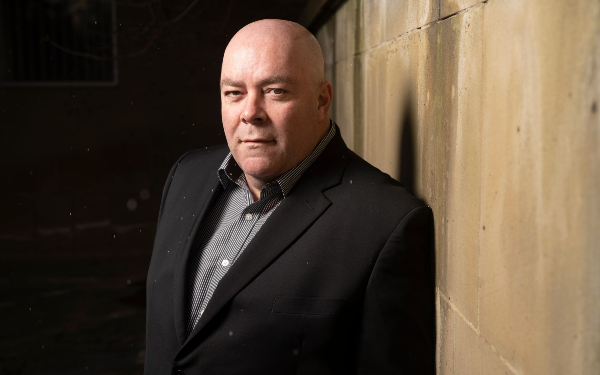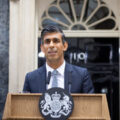
John Pearce’s year as Association of Directors of Children’s Services (ADCS) promises to be an eventful one.
The Durham director formally assumed the role today at a presidential reception alongside his fellow children’s services leaders.
Clapping him in was outgoing president Steve Crocker, who is also retiring from his post as DCS at Hampshire and the Isle of Wight.
Crocker’s year at the helm was dominated by proposals to overhaul children’s social care – from the Independent Review of Children’s Social Care and the Child Safeguarding Practice Review Panel’s inquiry into the murders of Arthur Labinjo-Hughes and Star Hobson – and the government’s response to them. The latter came out in February, with the consultation on it due to close next month.
Care review implementation
Pearce’s 12 months as president will be shaped by how the Department for Education (DfE), councils and the wider sector starts to implement reform.
This is due to start this September, when the first three, of 12, “pathfinder” areas start testing the DfE’s proposed model of family help and child protection services, families first for children, and another group will begin trialling its planned five-year early career framework for social workers.
In the same month, the DfE will publish national rules on the use of agency social workers in children’s services, which are due to come into force at the very end of Pearce’s presidency, in April 2024.
At that point, it will also launch two pilots of regional care co-operatives (RCCs), which the DfE intends will take over the commissioning of care placements from the individual local authorities that will be their members.
Under Crocker, the association was broadly supportive of the DfE strategy, and the care review proposals on which they were based, while pushing the department to go further in certain areas.
Attacking ‘profiteering’
Notably, he attacked “profiteering” by social work agencies and private children’s providers, even mooting a ban on agency work in response to practices such as restricting the supply of practitioners to project teams.
In his presidential speech, Pearce struck a similar note to his predecessor, saying that the association had “a crucial role to play in continuing to constructively engage and challenge government and partners to get the best deal for children”.
Speaking to Community Care before the reception, Pearce is clear that reform comes at a price.
While care review lead Josh MacAlister called for £2.6bn over four years – mostly for its proposed family help service – the DfE has so far committed the equivalent of 15% of this: £200m over two years.
Most of this discrepancy can be explained by its approach of testing the major reforms before full-scale implementation, likely in 2025-26, when, suggests Pearce, resources of the order recommended by MacAlister are likely to arrive.
MacAlister was clear that his proposals would more than pay for themselves, with improved family support and investment in kinship care contributing to a 30% reduction in the size of the care population in 2032 compared with current trends.
Reform ‘cannot be based on quicksand’
But reform will only work, says Pearce, by tackling what he sees as a lack of funding for councils to deliver their children’s social care responsibilities in the here and now.
He says: “The question is, how do we in build a bridge from now to 25-26 when the cavalry arrives, and how do we address the immediate pressures? Otherwise, you get to 2025 and you’re trying to reform a system based on quicksand.”
These immediate pressures are manifest in the 2% rise in the care population, 8% hike in referrals to children’s social care and 10% increase in the number of child protection enquiries in 2021-22.
They also figure in the 20% vacancy rate for local authority children’s social workers, leading to 16.7% of full-time equivalent roles being filled by agency staff, at increasing cost to councils.
Last year, ADCS estimated councils’ children’s services had an £800m funding gap in 2021-22, and warned that the government’s offer of a minor share of grant funding worth £1.3bn in 2023-24 and £1.9bn in 2024-25, and a slice of extra council tax revenue, would not suffice.
Related articles
“Not only are we starting from a point where finances are unstable, but we’re going to be striping out some of the resource and capacity we need to then transform the system,” says Pearce.
While the vast majority of councils will have medium-term financial plans that involve significant spending cuts, he says, Pearce is particularly concerned about what this will mean for smaller councils.
In his speech at the presidential reception, Pearce called on government to provide funding to bridge the gap to 2025-26, a challenging ask given ministers’ view that current funding for councils – and social care – is already generous.
‘We must celebrate social workers’ fantastic work’
Like Crocker, Pearce backs the DfE’s plans for national rules on the engagement of agency social workers by councils, including a national cap on fees and a ban on project teams and a prohibition on early-career social workers turning to locum work.
In its response to the consultation on the rules, the association reiterated its call for implementation to be brought forward from spring next year, given the urgency of the workforce pressures, councils face.
It also repeated its longstanding call for “a national workforce strategy that include a recruitment and retention campaign for child and family social workers which promotes the value of social work”, similar to those for teaching.
Pearce, who spoke to us before social workers faced negative media coverage in relation to the Finley Boden case and criticisms from the prime minister over responses to grooming, says: “We’ve seen the focus on social work when things go wrong, but not the same profile that shows the fantastic work our social workers do every day, managing risk, building relationships with children and making real change for families.”
No such campaign is on the horizon and measures set out in the DfE strategy to support practitioners are long-term, with the early career framework only due to come into force in 2026.
In the shorter term, Pearce supports an “acceleration” of what has been shown to work in the way councils support their practitioners, citing the use of social work academies to support learning and development and an emphasis on wellbeing.
Passion to tackle poverty
Unlike a majority of DCSs, Pearce is not a social worker himself, having worked his way up the local authority ranks in roles involving research, policy, commissioning and management in a career lasting almost 30 years.
However, he shares with many practitioners a commitment to tackling poverty, sharpened by working in the North East for the past seven years. The region overtook London in having the highest rate of relative child poverty, after housing costs (38%), in 2020-21, according to figures from the End Child Poverty coalition.
Nationally, 350,000 additional children were pulled into poverty from 2020-21 to 2021-22, bringing the total to 4.2m, showed government data, and the situation is likely to have worsened still since on the back of the cost of living crisis.
“It simply cannot be right that in a civilised society in 2023, we have record numbers of people turning to foodbanks for support because they cannot afford to feed themselves,” Pearce told the presidential reception.
As well as making the moral case against poverty, he pointed out that it was at the root of much of the demand that comes through the doors of children’s services, and also put the ambitions of the government’s agenda at risk of going unfulfilled.
“In very simple terms, if we do not intervene now to address the dangerous levels of child poverty in our society, we seek to undermine the aspirations set out in the government’s flagship reform agenda,” he added.
A more diverse leadership class
Pearce is the 18th president of the ADCS, which was set up in 2007 in recognition of the effective split between adults’ and children’s services brought in by the Children Act 2004. He is the tenth man to take the role, compared with eight women, but racial diversity has been lacking at the top of the organisation, reflecting an ongoing issue among DCSs.
Just 5% of directors were from a black or ethnic minority background, according to an ADCS survey published last year, compared with 24% of children and families social workers and over a third (34.5%) of the children directors serve.
Programmes such as the Black and Asian Leadership Initiative (BALI), run by leadership training body the Staff College, are seeking to tackle the barriers to progress for managers from black, Asian and ethnic minority communities, but progress is slow, a point Pearce recognises.
He says the ADCS will continue to work with the Staff College on this, as well as running its own task and finish group to examine how it can become more diverse as an association.
“We absolutely recognise that there’s a huge amount more to do,” he says. “We’ve a long way to go.”




 Bournemouth, Christchurch and Poole
Bournemouth, Christchurch and Poole  Hampshire County Council
Hampshire County Council  Lincolnshire County Council
Lincolnshire County Council  Norfolk County Council
Norfolk County Council  Northamptonshire Children’s Trust
Northamptonshire Children’s Trust  South Gloucestershire Council
South Gloucestershire Council  Wiltshire Council
Wiltshire Council  Wokingham Borough Council
Wokingham Borough Council  Children and young people with SEND are ‘valued and prioritised’ in Wiltshire, find inspectors
Children and young people with SEND are ‘valued and prioritised’ in Wiltshire, find inspectors  How specialist refugee teams benefit young people and social workers
How specialist refugee teams benefit young people and social workers  Podcast: returning to social work after becoming a first-time parent
Podcast: returning to social work after becoming a first-time parent  Podcast: would you work for an inadequate-rated service?
Podcast: would you work for an inadequate-rated service?  Family help: one local authority’s experience of the model
Family help: one local authority’s experience of the model  Workforce Insights – showcasing a selection of the sector’s top recruiters
Workforce Insights – showcasing a selection of the sector’s top recruiters 

 Facebook
Facebook X
X LinkedIn
LinkedIn Instagram
Instagram
Interesting he mentions that there is not enough diversity and suggest that Black and Asian candidates need some more education and training via the leadership college to reach the standards of white colleagues. Nothing has changed there for black and Asian practitioners, so we will continue to struggle to reach those positions. O yes the only reprieve for us is to go agency because we are being overlooked, or the expectation set on us are higher than our white colleagues. This inevitably means we do not progress in our career. Frustrated and tired of all this cycles of biases across social work.
Completely agree. The racism embedded I. social worker is clearly explained, thank you
Here’s a challenge, read the ineagrual pontifications of the past 5 Presidents and identify what seperates their ‘vision’ from each other. For those of you who are busy actually doing social work, a shortcut can be found in the word Nothing. Here’s a thought, instead of buggins turn, why not have candidates make public declaration of suitability and allow the social workers they claim to represent vote for them. Open democracy, transparency in the process and ownership by practitioners is worthy is it not?
Expecting accountability, transparency, democratic sensibility and commitment to structural changes from senior and strategic ‘leaders’ in social work gets one a “bad and untrustworthy” reputation Trevor. Speaking as a recipient of many an eye roll and murmurings of “off on one again” brickbats I know this to be a truth foretold.
Still handwringing about “how” the ADCS can become more diverse? Need another report, another “finish” group to tell you how? As the great Sir Olivier said to his Method obsessed co-star in search of his motivation for the character “just act”. Angst is the corroding toxin within social work. Sometimes the obvious is the answer. That is if solutions are really the aspiration.
I see kids being funded thousands per week, one placement i work in is over 10,000 per week per child, then you see no funding available, no beds, no social worker, no advocate, no risk assessments, no care plans, there is no equality in workplace or for anyone in care sector, unregulated homes are all over and some of the most appalling conditions, if this sector is ‘regulated’ how? Is my question, how if ofsted, cqc, ciw, and regulatory bodies are struggling now.. How is this going to be addressed?
Kids are at risk and have been severely let down by a system that just doesn’t work and hasn’t for a long time..same with rest of sector, if the public could see the real truth I truly don’t believe wed be in this position.
We need to develop a culture of openness and transparency and speaking up should not be feared..
Voices need to be heard and accountability needs to be taken.
Change was needed yesterday, we have now ??